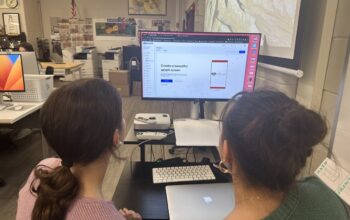
Joelle Anselmo, Executive Editor
Cartoon by Natalie Frank
As we are starting second semester, with some of us already knowing where we are going for the next four years, some of us receiving deferral after deferral, some of us settling for the money, some of us praying for their dreams to come true, we all have one thing in common. The long-awaited, inevitable, misfortunate, deadly disease to both the mind and physical body: Senioritis. I’ve conducted a health report to give you the breakdown of the short and long term effects, the process and progression of the disease, and have even interviewed key experts to inform the public of the severity of this illness.
Triggers:
While one may see no justification to Senioritis, there are several reasons as to why students aren’t working as hard as they used to. Being accepted in college, especially Early Decision, serves as a major trigger for feeling like work isn’t necessary anymore. “After being accepted, I feel like just taking a back seat for a little as I have worked all these years for a purpose and finally it has been achieved,” an anonymous source said.
Another source explained how it’s just a mere break in the grand scheme of life, “While I do still care about my school work and learning, I just want to relax for a small amount of time in our relative lifespan.” This longing for relaxation stems from the feeling of “being drained” as sources described it, for four consecutive years. High school mattered from the minute your tiny freshman self walked through the front doors and hasn’t stopped since. Your so called breaks didn’t give you any sort of comfort either as you additionally had to do SAT and AP testing preparation over the summer and school year and study for midterms during breaks.
There are environmental triggers as well. Pressure from parents and students around you can impact the need for a break as well. “New Canaan has a certain expectation from some of the kids and sometimes it is hard to maintain,” one anonymous source said.
The Risk Assessment:
This committee was created to aid those suffering from Senioritis and limit its harmful effects. By addressing the hazards and potential consequences of this disease, the goal is to confine it and prevent its spreading as much as possible. So far, from interviewing various anonymous subjects, the Committee has discovered the aftermath of Senioritis. Firstmost, is the materialistic and detrimental effects to the average student. A drop in grades, work ethic, participation, and mainly attendance, are all common among second semester seniors. English teacher Katherine Munson noted that “even when they are in class, they aren’t mentally there, it’s just a physical shell.”
Yet these effects have their set of consequences that hurt the body even more severely than one would expect, creating a never ending and incurable cycle. A lack of motivation leads to an increase in stress, therefore an increase in attitude. This attitude contributes to a feeling of frustration, which you may take out on your parents or teachers. This lack of motivation also leads to an aggravated teacher and/or parent, which deepens your stress and adds to your anxiety, diagnosed or not. These risk factors are still under consideration of being “curable.” and solutions are being tested everyday in order to end this epidemic once and for all.
The long term effects of Senioritis are not confirmed. The only viable sources the Committee could obtain this information from was from people who predicted the life lasting impacts because of their knowledge from past students they’ve witnessed. Ms. Munson conveyed her utmost worry that students have a false notion that their education is finished for good. “You might think you’re done in your head and as a high school student, but really your career as a student is still in front of you,” she said. With college approaching in several months, this source noted that “College is a lot harder, there’s no hand holding, no support, no extensions, not the way there is at the high school.” Another source, Anthropologist and Social Studies teacher Jonathan Schwartz, doesn’t see materialistic impacts so much as he sees mental ones. “I think it’s detrimental long term but not because it’s going to effect their ability to do well in college but because it pushes off accountability,” he said.
The Solution:
After talking amongst various interviewees, the Committee discovered that Senioritis may not be curable at all. “The only thing that might cure it is if my grades truly tank,” an anonymous source said. Another way to cure this disease is to look at it from a new perspective.“This is the first time students are not doing work to get the grades or to please their parents, they are doing it for themselves. They don’t have to impress anybody,” Mr. Schwartz said. He highlights how it’s more effort to be bored in class than to be interested. “I think it’s sad because students are sitting through a lot of hours just waiting for it to be over,” Mr. Schwartz said. “It’s your last semester, how do you want to use it?”



